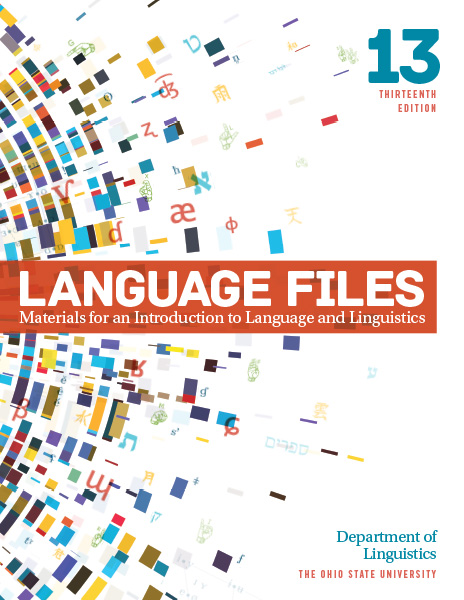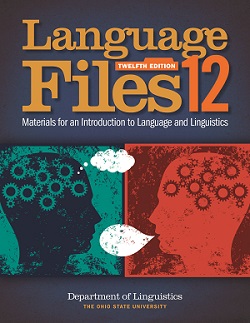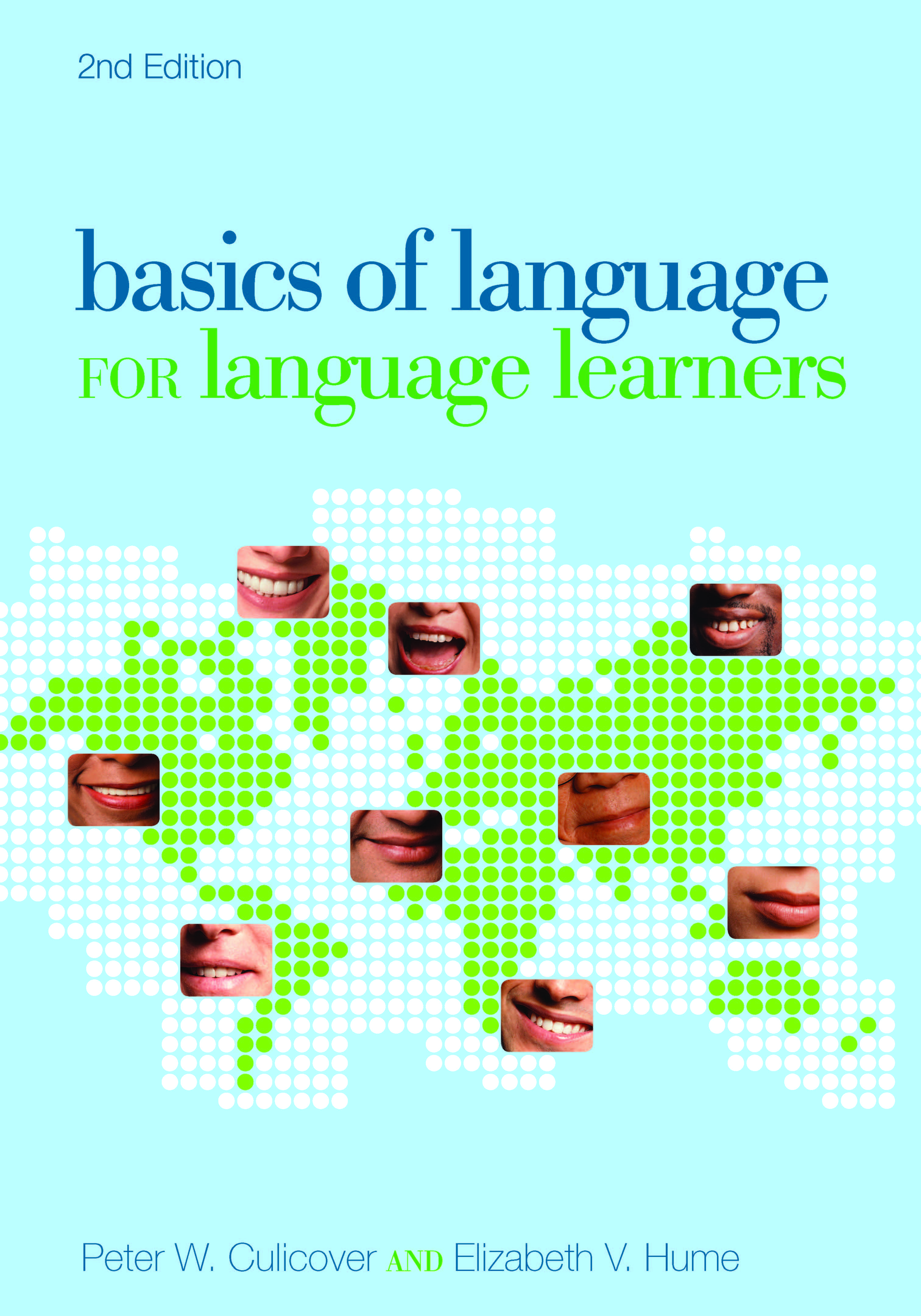The 13th edition is scheduled to be available for the Fall 2022 Semester. It is due in August of 2022. Please use the 12th edition for Spring and Summer 2022 classes.
Language Files: Materials for an Introduction to Language and Linguistics has become one of the most widely adopted, consulted, and authoritative introductory textbooks to linguistics ever written. The scope of the text makes it suitable for use in a wide range of courses, while its unique organization into student-friendly, self-contained sections allows for tremendous flexibility in course design.
The twelfth edition has been significantly revised, clarified, and updated throughout—with particular attention to the chapters on phonetics, phonology, pragmatics, and especially psycholinguistics. The restructured chapter on psycholinguistics makes use of recent research on language in the brain and includes expanded coverage of language processing disorders, introducing students to current models of speech perception and production and cutting-edge research techniques. In addition, exercises have been updated, and icons have been added to the text margins throughout the book, pointing instructors and students to useful and engaging audio files, videos, and other online resources on the accompanying Language Files website, which has also been significantly expanded.
The Department of Linguistics at The Ohio State University (website), founded in 1963, is world renowned for its programs in computational, descriptive, theoretical, and experimental linguistics.
The Linguistics Department's Language Files main page:
http://linguistics.osu.edu/research/pubs/lang-files
Links pages:
http://linguistics.osu.edu/research/pubs/lang-files/links
Sound files pages:
http://linguistics.osu.edu/research/pubs/lang-files/sounds
Errata page:
http://linguistics.osu.edu/research/pubs/lang-files/errata
Application for Instructor Resources page credentials:
http://ohiostatepress.org/Other/LFInstMan.htm
Instructor Resources pages (includes answer key, requires credentials):
http://www.ling.ohio-state.edu/publications/files/instructors/lf12/
Contents
List of Symbols
Preface to the Twelfth Edition
AcknowledgmentsChapter 1: Introduction
File 1.0 What Is Language?
File 1.1 Introducing the Study of Language
File 1.2 What You Know When You Know a Language
File 1.3 Other (Non-Essential) Aspects of Knowing a Language
File 1.4 Design Features of Language
File 1.5 Language Modality
File 1.6 PracticeChapter 2: Phonetics
File 2.0 What Is Phonetics?
File 2.1 Representing Speech Sounds
File 2.2 Articulation: English Consonants
File 2.3 Articulation: English Vowels
File 2.4 Beyond English: Speech Sounds of the World’s Languages
File 2.5 Suprasegmental Features
File 2.6 Acoustic Phonetics
File 2.7 The Phonetics of Signed Languages
File 2.8 PracticeChapter 3: Phonology
File 3.0 What Is Phonology?
File 3.1 Phonotactic Constraints and Foreign Accents
File 3.2 Phonemes and Allophones
File 3.3 Phonological Rules
File 3.4 Implicational Laws
File 3.5 How to Solve Phonology Problems
File 3.6 PracticeChapter 4: Morphology
File 4.0 What Is Morphology?
File 4.1 Words and Word Formation: The Nature of the Lexicon
File 4.2 Morphological Processes
File 4.3 Morphological Types of Languages
File 4.4 The Hierarchical Structure of Derived Words
File 4.5 Morphological Analysis
File 4.6 PracticeChapter 5: Syntax
File 5.0 What Is Syntax?
File 5.1 Basic Ideas of Syntax
File 5.2 Syntactic Properties
File 5.3 Syntactic Constituency
File 5.4 Syntactic Categories
File 5.5 Constructing a Grammar
File 5.6 PracticeChapter 6: Semantics
File 6.0 What Is Semantics?
File 6.1 An Overview of Semantics
File 6.2 Lexical Semantics: The Meanings of Words
File 6.3 Compositional Semantics: The Meanings of Sentences
File 6.4 Compositional Semantics: Putting Meanings Together
File 6.5 PracticeChapter 7: Pragmatics
File 7.0 What Is Pragmatics?
File 7.1 Language in Context
File 7.2 Rules of Conversation
File 7.3 Drawing Conclusions
File 7.4 Speech Acts
File 7.5 Presupposition
File 7.6 PracticeChapter 8: Language Acquisition
File 8.0 What Is Language Acquisition?
File 8.1 Theories of Language Acquisition
File 8.2 First- Language Acquisition: The Acquisition of Speech Sounds and Phonology
File 8.3 First- Language Acquisition: The Acquisition of Morphology, Syntax, and Word Meaning
File 8.4 How Adults Talk to Young Children
File 8.5 Bilingual Language Acquisition
File 8.6 PracticeChapter 9: Psycholinguistics
File 9.0 How Do Our Minds Understand and Produce Language?
File 9.1 Language and the Brain
File 9.2 Language Disorders
File 9.3 Speech Production
File 9.4 Speech Perception
File 9.5 Lexical Access
File 9.6 Sentence Processing
File 9.7 Experimental Methods in Psycholinguistics
File 9.8 PracticeChapter 10: Language Variation
File 10.0 What Is Language Variation?
File 10.1 Language Varieties
File 10.2 Variation at Different Levels of Linguistic Structure
File 10.3 Factors Influencing Variation: Regional and Geographic Factors
File 10.4 Factors Influencing Variation: Social Factors
File 10.5 Language and Identity
File 10.6 PracticeChapter 11: Language and Culture
File 11.0 What Is the Study of “Language and Culture”?
File 11.1 Linguistic Anthropology
File 11.2 Language and Thought
File 11.3 Language and Power
File 11.4 Politeness
File 11.5 Ethnography
File 11.6 PracticeChapter 12: Language Contact
File 12.0 What Is Language Contact?
File 12.1 Language Contact
File 12.2 Borrowings into English
File 12.3 Pidgin Languages
File 12.4 Creole Languages
File 12.5 Societal Multilingualism
File 12.6 Language Endangerment and Language Death
File 12.7 Case Studies in Language Contact
File 12.8 PracticeChapter 13: Language Change
File 13.0 What Is Language Change?
File 13.1 Introducing Language Change
File 13.2 Language Relatedness
File 13.3 Sound Change
File 13.4 Morphological Change
File 13.5 Syntactic Change
File 13.6 Semantic Change
File 13.7 Internal Reconstruction and Comparative Reconstruction
File 13.8 PracticeChapter 14: Animal Communication
File 14.0 How Do Animals Communicate?
File 14.1 Communication and Language
File 14.2 Animal Communication in the Wild
File 14.3 Can Animals Be Taught Language?
File 14.4 PracticeChapter 15: Writing Systems
File 15.0 What Is Writing?
File 15.1 Writing, Language, and Culture
File 15.2 Types of Writing Systems
File 15.3 The Historical Evolution of Writing Systems
File 15.4 PracticeChapter 16: Language and Computers
File 16.0 What Is Computational Linguistics?
File 16.1 Speech Synthesis
File 16.2 Automatic Speech Recognition
File 16.3 Communicating with Computers
File 16.4 Machine Translation
File 16.5 Corpus Linguistics
File 16.6 PracticeChapter 17: Practical Applications
File 17.0 What Can You Do with Linguistics?
File 17.1 Language Education
File 17.2 Speech- Language Pathology and Audiology
File 17.3 Forensic Linguistics
File 17.4 Language in Advertising
File 17.5 Codes and Code- Breaking
File 17.6 Being a Linguist
File 17.7 PracticeAppendix: Answers to Example Exercises
Glossary
Selected Bibliography
Language Index
Subject Index
IPA Symbols and Example Words
American English Consonant and Vowel Charts
Official IPA Chart
Related Titles:

Language Files
Materials for an Introduction to Language and Linguistics, 12th Edition
Department of Linguistics, The Ohio State University




